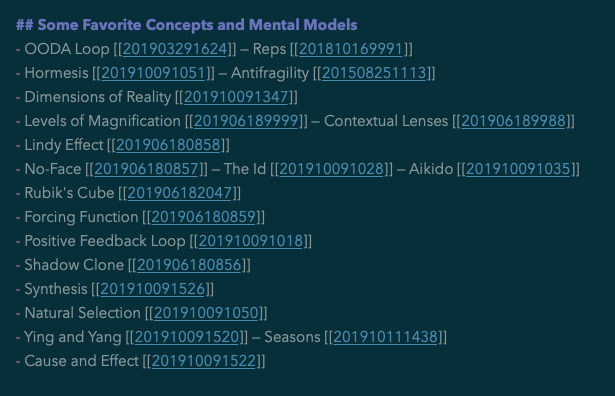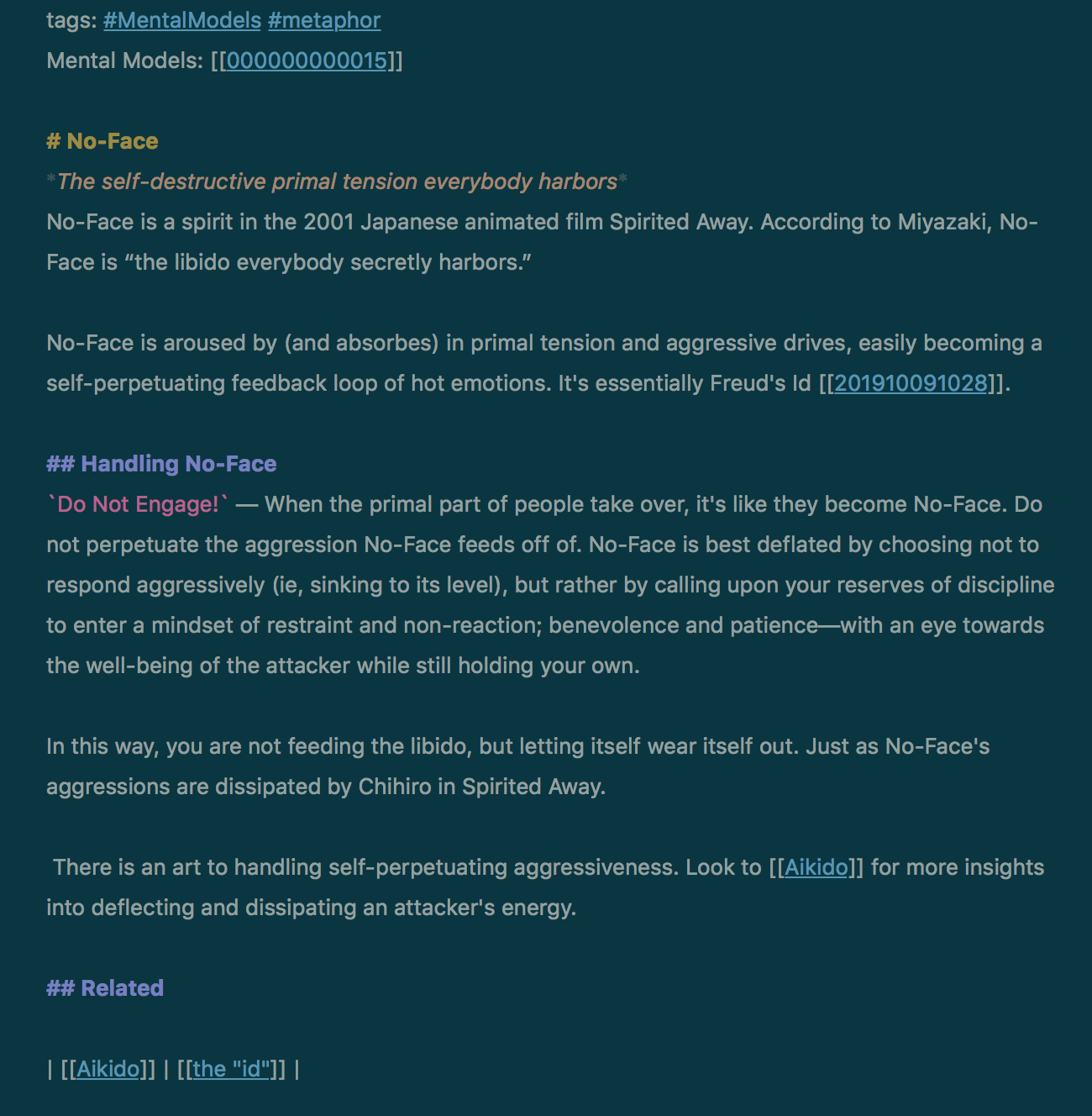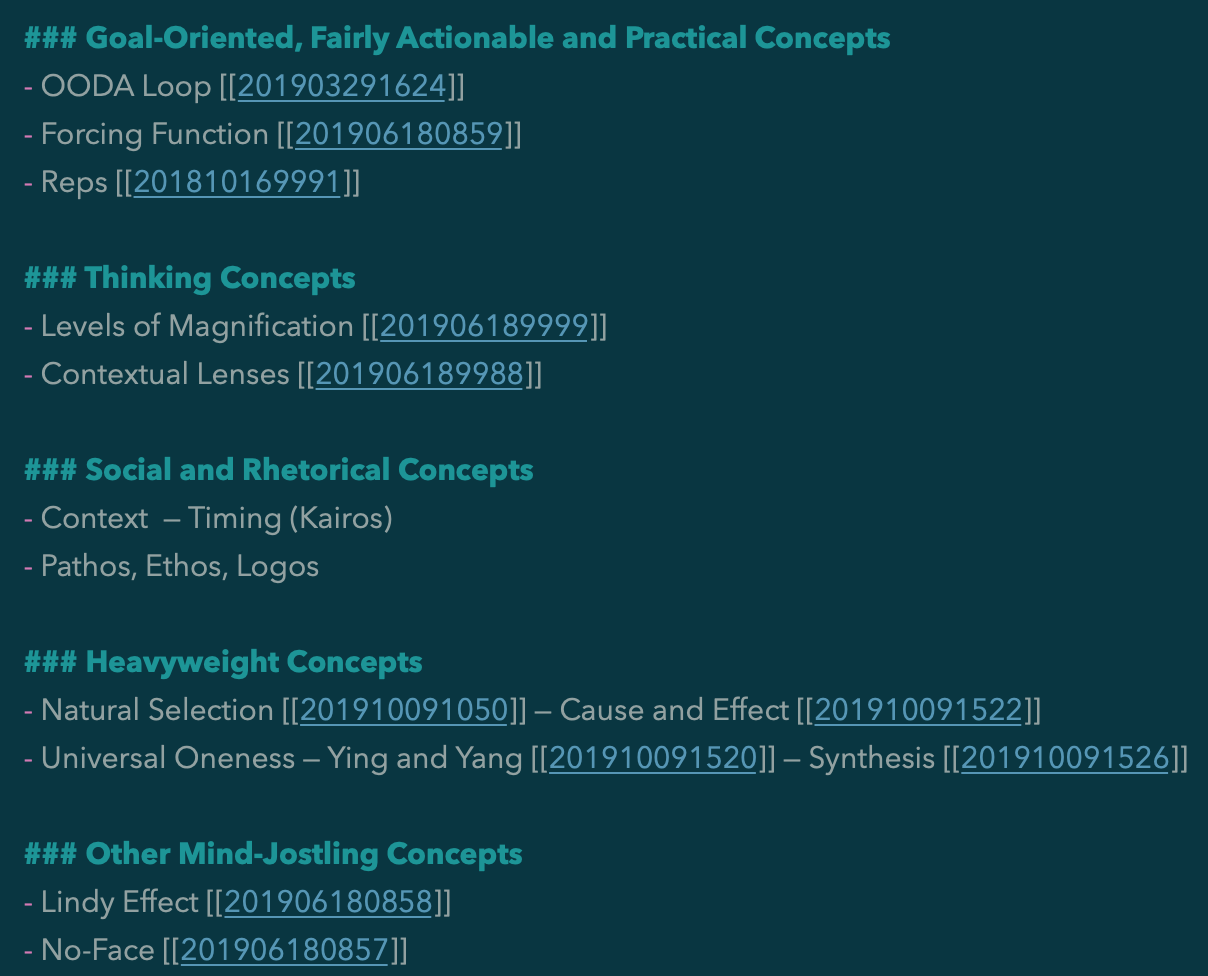Let's talk about Ideas and Concepts
I am utterly enthralled with some sort of quixotic quest to find, categorize, and ruminate on awesome ideas and concepts. Thanks to @mleo2003 for sharing your post about The Syntopicon, which is such a preposterous and ambitious idea that I, at the very least, feel a to-my-bones appreciation for efforts of Mortimer J. Adler and friends.
Here's their 102 Great Ideas organized by category: https://www.thegreatideas.org/103ideascat.html. If there is interest, I would like to create a separate thread where we discuss the validity of The 102 Great Ideas: how they overlap, what is redundant, and what is missing—especially since they explicitly did not cover ideas outside of the Western tradition.
Sometimes in the shower, I have daydreams about creating The Concepticon—a cross-linked and fairly comprehensive list of important concepts...although, alas, I am but an amateur and certainly no Adler! As of now, these concepts are defined roughly just as any concept that when I think about it, I feel a certain sense of awe, or groundedness, or universal fundamental-ness, or wisdom.
Here's a screenshot showcasing some of these concepts:
There are so many fascinating concepts. I will definitely be adding: Flow and Sfumato among others.
Is anyone else just super stoked thinking about ideas and concepts, or should I keep my thoughts to my shower?
What are some of your favorite concepts?
Howdy, Stranger!

Comments
I think being an amateur isn't a sign of not being good at something. I cannot recall the name of that one particular man: this guy's living in a secluded house in the alps and researches for decades everything about a very small niche in music. That's the dedication you get from the love for doing something Try that with a 2-year research grant.
Try that with a 2-year research grant.
The mental models screenshots looks interesting! I enjoy the Farnam Street blog and podcast, and am pondering if Scott Page's "Model Thinker" (featured in Ep 55 or so) is a useful book to have. I do have read collections of cognitive fallacies, for example, and find the Wikipedia overview on biases quite comprehensive. But I don't know what to do with them except memorize.
This makes me curious what your vision is
Author at Zettelkasten.de • https://christiantietze.de/
I judge the quality of thoughts and actions before things like amateur and pro, student or scholar, published or nonpublished. Your post is thought-provoking indeed.
Yes, the mental model's screenshot intrigues. Many listed I've never heard of before and I've spent a lot of time reading about mental models, biases, and mental heuristics. 65 of 714 notes tagged #mental_models
I can second @ctietze's recommendation for the Farnam Street blog and podcast.
Do you have resources you can recommend?
Will Simpson
My peak cognition is behind me. One day soon, I will read my last book, write my last note, eat my last meal, and kiss my sweetie for the last time.
My Internet Home — My Now Page
@ctietze I agree regarding the word "Amateur". I'm actually grateful to hear it referred to it in its original context, since in Latin, “Amator” = "lover". Around 1775, it found its way into Middle French with the French suffix -teur, leading to “Amateur”. Amateur astronomists and scientists have made all sorts of meaningful contributions to humanities journey.
I was not aware of the Farnam Street blog; it seems like a kindred perspective to what I'm focused on. I look forward to listening to a few of the podcasts, but not too many, as I don't want to cloud any unique angle I may be able to contribute at some point.
My vision? I haven't asked myself that. It's too soon, but I'll take a stab. I think we kinda know what to do in our lives—we're wiser than we think—but we need some nudges and reminders. So why not create a list of empowering, grounded, time-tested, and actionable concepts to refer to throughout the days, weeks, months, and years of our lives?
For example, if I open up the note pictured above, I see "Reps" and I think, "Oh yeah, if I want to improve in my specific craft, the not so secret secret is getting consistent repetitions, so I better get my reps in today." Or if I see "Lindy Effect" I might say, "you know what, I don't need to watch that new Netflix show today. But if it gets an Emmy nomination, or people are still talking about it 6 months from now, then maybe I should devote the time." (Note: I'm in the industry so it's important for me to stay current on way too many shows.)
For the sake of the topic, here are the terms defined as best I could:
ConceptsA concept is a pattern, truth, or mechanism recognized and given a name.Mental Modelsare specific readily-available patterns or mechanisms that—when applied to a current situation or thing—allow for efficient, optimal action. Great for strategic agency and in-the-moment adaptability.@Will the thing is, one person's golden concept is another person's garbage. That's why you see some concepts you haven't seen before: it's because I read/watched something and thought, "Now there's a juicy powerful concept, let me nounify it!" A good example of that is "No-Face", a fascinating entity from Hayao Miyazaki's animated film Spirited Away. My note on that (which is an ongoing work in progress) looks like:

Isn't this kind of cool? At least to me it is Comments and ideas are most welcome!
Comments and ideas are most welcome!
I love Spirited Away, so this was a very, very pleasant surprise! Also, "No-Face" is such a cool name for a pattern (The German dub uses "Ohngesicht", which sounds right out of a fairy tale by the Brothers Grimm: a plain description "ohne Gesicht" or "without [a] face" is mushed together into a single word, dropping a vowel. Now I wonder why this creature is named thusly; why no face? Why does it wear a mask?)
(The German dub uses "Ohngesicht", which sounds right out of a fairy tale by the Brothers Grimm: a plain description "ohne Gesicht" or "without [a] face" is mushed together into a single word, dropping a vowel. Now I wonder why this creature is named thusly; why no face? Why does it wear a mask?)
Here're two candidates I'd like to throw in, two I live by every day. Most things I have collected revolve around building, including these.
Single Responsibility Principle
A programming principle among many, this one was useful time and again and also informed the "principle of atomicity" on this blog.
# 201302161820 Single Responsibility Principle Single Responsibility Principle (SRP): "[A] class or module should have one, and only one, _reason to change_."[138][#martin2009cc] ("Change" means touching the code, not changes to object contents in main memory.) Instead of applying SRP to figure out a responsibility of a design element/module, as if it was an essential property of naive ontology, consider a process-based approach: how many reasons does a thing have to change? [#martin2009cc]: Robert C. Martin (2009): _Clean Code. A Handbook of Agile Software Craftsmanship_, Upper Saddle River: Prentice Hall.Black Box
Not just in a descriptive way, but also for creating complex things from simpler components, this helps to figure out how to start from nothingness.
# 201610081507 Black Box unifies the whole of software modelling in modules The metaphor of the "black box" is very common in programming. It is so general that it's nearly meaningless; but it summarizes a lot of specialized principles nicely and shows a unifying principle. A black box is characterized by: * a boundary * input * output The IO part is obvious and most people stop there; but the boundary part is even more important. It can be applied to "modules" on all levels of abstraction * See module partitionings in code [[201610261010]] for a list of levels from statements to whole applications and their respective modularity. <!-- ------------------------------- --> # 201610261010 Module partitionings in code The term "module" can be used for different partitions: 1. statements 2. functions 3. objects 4. object groups ("modules" in a colloquial sense), affecting architecture 5. libraries 6. applications What's the boundary of an object? Why does it do X but not Y? -- You can find answers to this design question while adhering to the Single Responsibility Principle [[201302161820]] as a guiding heuristic. But in the end, it boils down to **justifying why you drew boundaries in some places and not others.**Author at Zettelkasten.de • https://christiantietze.de/
Thank you for sharing these two usable concepts. Being able to atomize, distill, partition, or otherwise categorize a Thing is an invaluable skill of good thinking. It got me thinking about how to categorize any concept. I hope the following is worth sharing...
From talking with a few folks about the grandiose idea of collecting and categorizing concepts, I've learned that it's so subjective.
Here's an example of the troubles with categorizing concepts: Don't you think "Seasons" is a great concept? It speaks to how things change, but in a cyclical manner. So fundamentally, "Seasons" might be (non-exclusively) under a broader concept called "Cycles".
What if you had the goal of only having your favorite useful concepts handy—like a dashboard, like the first screenshot on this post? Which term do you choose to be your reminder of this useful thought?
Now if you are a poet, you'd probably prefer that your chosen conceptual reference point be "Seasons" as opposed to "Cycles", because "Seasons" evokes poetic imagery more naturally, while "Cycles" might be the more poignent term for someone doing laundry.
Additionally, each person has a notably high level of uniqueness in the concepts that mean the most to them. For @ctietze "Single Responsibility Principle" and "Black Box" are two extremely important concepts because he builds and distills atoms of thought.
For a manual laborer—say a restaurant dish washer—those two concepts wouldn't mean as much. Seeing the dishes piling up, they might find solace in fable "The Tortoise and the Hare" and would say to themselves "Slow and steady wins the race." And what is that other than a pattern or truth packaged (ie a Concept) into a phrase of how many small things, over time, can become a massive thing—like developing a skill, building strength, or building the pyramids. So if we ask the dish washer "what do you say to yourself to calm your anxiety over all those dishes?", how might he answer?
It leaves me wondering how quixotic and foolish it is to try to create a universal list of valuable concepts for anyone but myself.
This project may be "quixotic and foolish" but it is our quixotic-ness and foolishness.
You describe beautifully how different people can look at the same "valuable concept" and speak about them from their own perspective and still squeeze a nugget of value from it. It matters not if you are a Ph.D. in neurochemistry or a woodworker. What matters is an openness and a Baysian attitude towards your experience. (Sorry, I dropped into a little bit of a philosophical mode there for a moment.)
Will Simpson
My peak cognition is behind me. One day soon, I will read my last book, write my last note, eat my last meal, and kiss my sweetie for the last time.
My Internet Home — My Now Page
It sounds to me that you are searching archetypes.
I am a Zettler
@Will Supercool, can you elaborate on what a Bayesian attitude is?
A bayesian attitude is a shorthand for a willingness to change your mind when new facts become known. Sometimes hard to do as old ideas become cherished ideas. Easy to do in some domains, harder in others. A valuable skill to have and foster.
Will Simpson
My peak cognition is behind me. One day soon, I will read my last book, write my last note, eat my last meal, and kiss my sweetie for the last time.
My Internet Home — My Now Page
I appreciate the comments. @Sascha I agree that part of what I'm trying to do involves searching for the archetypes. It made me want to figure out and attempt to better articulate this thing.
Defining this Project
Playing with and defining Concepts and Mental Models by categorizing them and how they relate to each other.
Categorizing: there are many ways to categorize knowledge. I've identified a few that have naturally developed for me in the screenshot below. "Categorizing" includes searching for and connecting a Concept's: archetypes and actionable and practical heuristics, along with its folksy sayings, examples from literature and history, as well as from pop culture.

Here are some attempts at trying to define what I'm trying to do:
Goals
Using Concepts to Think and Express Better. How Better? More:
Use Cases
If anyone took the effort to read this; please share any thoughts you might have.